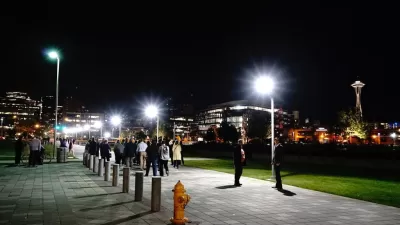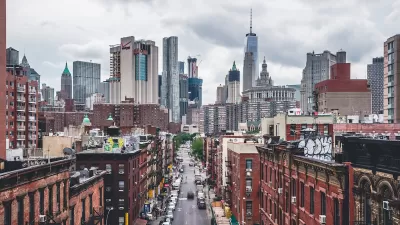One of the perks of my job is getting to know new cities and neighborhoods. We research, create a lot of graphics and talk with a lot of people. In the course of those discussions, while people often exhibit pride in where they live, there is also an underlying concern that frequently goes something like this: “We feel like a last place team – the one that can never get out of the cellar.” “There is a real self-image problem here.” “You can’t do that in [insert name of place here] because we
One of the perks of my job is getting to know new cities and neighborhoods. We research, create a lot of graphics and talk with a lot of people. In the course of those discussions, while people often exhibit pride in where they live, there is also an underlying concern that frequently goes something like this:
- "We feel like a last place team – the one that can never get out of the cellar."
- "There is a real self-image problem here."
- "You can't do that in [insert name of place here] because we're different than other places."
- "There's a community inferiority complex here."
- "Too many people see what's wrong and not what's right."
Sound familiar? It seems many places are afflicted with a lack of self esteem. It's hard to measure that kind of problem. Even harder to point a finger at a solution. If you're an individual and have some self doubt, maybe you would consider picking up a self-help book. Or perhaps therapy? Is there such a thing as urban therapy? I suspect a few places would schedule regular visits.
The self-help craze offers some typical solutions to fixing self esteem: "change negative thoughts to positive ones," "reinforce a positive self-image," etc. I chuckle when I see these kinds of statements as I'm often reminded of Stuart Smalley. For those reading this that are too young and / or believe that Saturday Night Live started with Will Ferrell, please consult the web. Stuart Smalley's daily affirmation – "I'm Good Enough, I'm Smart Enough, and Doggone It, People Like Me!" was always delivered with such transparent disbelief that it became a popular way to criticize the quick, self-help, fix.
But given the popularity of this stuff, maybe we should take a quick moment to find some inspiration from self-help guidebooks. So I did a quick Google search to see what's being peddled nowadays. I even added the word "cities" to see what would come up. Alas nothing but in the course of that procrastination Google I found some sites with the germ of a few potentially valuable ideas. The emphasis on "taking care of yourself" for instance often refers to improved physical health. Today, exercise and nutrition are increasingly discussed as an urban planning problem but I hadn't thought of them as also a boost to urban self-esteem. Perhaps feeding the mind of the individual will bubble up to the scale of the community if enough people are involved. Take other typical self-help ideas - "make your meals a special time" made me think of the well-organized community dinners and roving block parties some cities support. I also personally like the idea of a "celebratory scrapbook" that could be created by neighborhoods as sort of a window into their values and successes.
Then there is the "mutual complimenting exercise" or self-affirming lists that Stuart Smalley loves. As odd as it sounds, I think there's some value in this at the community level. In past planning projects when we've asked people to define their successes as a community and not focus on the problems, we're often presented with a lengthy and robust list. People are indeed quite proud of their neighborhoods. They just need excuses to talk positvely about them which is in part what a plan can help facilitate.
Of course none of these, what I would call additive measures, replaces a real physical and economic transformation - the kind that comes with sustained and smart investment. But they might help set the stage to make that investment a little easier to come by.
Or maybe cities just need the real quick fix – a winning sports team. I laughed out loud this morning when I heard the following on NPR – "I'm so excited!!! Philadelphia finally won something." Is Stuart Smalley a Phillies fan?

Maui's Vacation Rental Debate Turns Ugly
Verbal attacks, misinformation campaigns and fistfights plague a high-stakes debate to convert thousands of vacation rentals into long-term housing.

Planetizen Federal Action Tracker
A weekly monitor of how Trump’s orders and actions are impacting planners and planning in America.

In Urban Planning, AI Prompting Could be the New Design Thinking
Creativity has long been key to great urban design. What if we see AI as our new creative partner?

King County Supportive Housing Program Offers Hope for Unhoused Residents
The county is taking a ‘Housing First’ approach that prioritizes getting people into housing, then offering wraparound supportive services.

Researchers Use AI to Get Clearer Picture of US Housing
Analysts are using artificial intelligence to supercharge their research by allowing them to comb through data faster. Though these AI tools can be error prone, they save time and housing researchers are optimistic about the future.

Making Shared Micromobility More Inclusive
Cities and shared mobility system operators can do more to include people with disabilities in planning and operations, per a new report.
Urban Design for Planners 1: Software Tools
This six-course series explores essential urban design concepts using open source software and equips planners with the tools they need to participate fully in the urban design process.
Planning for Universal Design
Learn the tools for implementing Universal Design in planning regulations.
planning NEXT
Appalachian Highlands Housing Partners
Mpact (founded as Rail~Volution)
City of Camden Redevelopment Agency
City of Astoria
City of Portland
City of Laramie






























